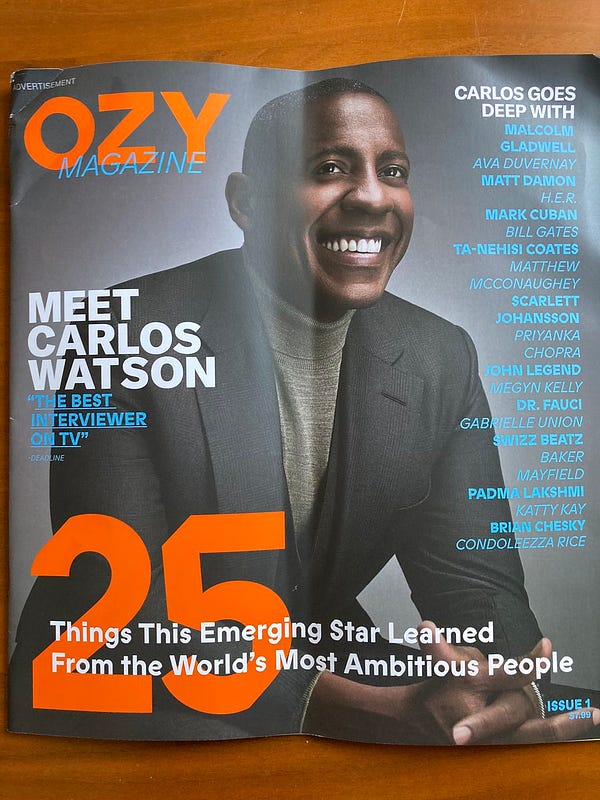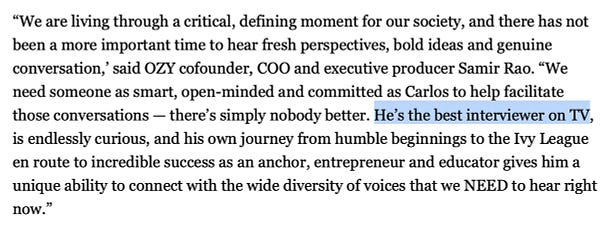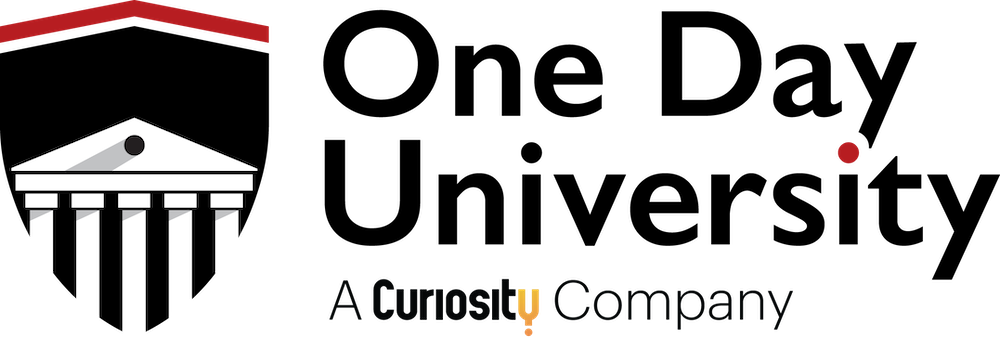Welcome to the 500-odd new subscribers to The Rebooting. Thanks to Ben Smith allowing me to weigh in on the batshit crazy Ozy Media story. If you haven’t read it already, read it for the incredible details but also how obvious it always was that Ozy was not what it purported to be. I put aside my plans to delve into my year-of-Substack review to use Ozy as an example of what I believe is a major cultural hurdle to making publishing more sustainable: The high tolerance for bullshit.
But before we get into that, I want to tell you a bit about this week’s sponsor….
What’s a publisher like One Day University have to do with sustainable media? The answer is is pretty interesting: they provide an opportunity for other publishers to add more value to their subscriptions by offering a no-cost trial subscription to One Day University's library of courses, which cover everything from history, politics, and psychology to music, art and film. They even throw in some philosophy, literature and sometimes a little business. For One Day U, the engaged and intellectually curious people who pay for news products are exactly the type of people who pay for "edutainment" that helps them understand the world better. And they’re the same people who are somewhat fascinated by the opportunity to interact with the most notable professors in the country from Yale, Stanford, Harvard and Michigan. One recent publishing partner in New England saw a 25% drop in churn in a matter of weeks. Get in touch with its founder Steven (steven@onedayu.com) to understand more about how a partnership with One Day can help make your subscription business more sustainable. And yes, more profitable.
Living in Miami is a great reminder that much of what you see in the world is fake. Between the body augmentations to even the natural surroundings, much of Miami is completely fabricated. Even the palm trees, adopted as a symbol of Miami’s brand image as paradise, are mostly imported. The beach? Except for a small part of South Pointe, the sand has been imported.
The same is too often the case in media, where hype often comes ahead of actual business results. The story of Ozy Media was finally told this week in The New York Times, with several eye-opening details, including an Ozy executive impersonating a YouTube executive in a call wooing a potential backer. For several years, Ozy has flummoxed me and many others in the media business. Just in August, a publishing CEO described Ozy as “WeWork but without the chance of success.” The only question was whether it was the normal fake-it-till-you-make-it story or something worse.
I have seen enough hustles to know the formula. Read the books on Theranos and WeWork if you need a refresher:
Charismatic founder
Grandiose visions that don’t match reality
Influential and deep-pocketed backers from other fields
Unverified numbers that appear too good to be true
An unusual amount of PR without much in the way of results
This is a story that’s repeated time and again across our society. Smart people often fall prey to charismatic charlatans. My guess is the reasons are greed and ego, since successful people in one field tend to believe to their core they can easily succeed in other areas. That makes them easy marks. The ongoing Theranos trial makes clear that some of the truly “best and brightest” were completely out to lunch in doing basic due diligence in their roles as board members and investors in Theranos. But it also indicates that a certain level of stretching the truth is considered par for the course. Or consider WeWork, where the red flags piled up in clumps, with CEO Adam Neumann regularly making outlandish promises that didn’t pan out and misstating its numbers. In other words, he was dishonest. But Silicon Valley has a long track record of excusing dishonest and unethical behavior as “playing to win.”
In the media business, the sizzle to steak ratio has always fluctuated. Traditional media has long been propped up by shared delusions and a high tolerance for bullshit. Explain Nielsen to anyone not in the media industry and ask them if it makes sense for this entity to play a fundamental role in the allocation of billions of dollars. (Not that ComScore was much better.) Every part of the industry had its hustles. Magazine publishers regularly finessed their circulation numbers to maintain their rate bases. Payola was an integral part of the radio industry. Bullshit has long been a feature, not a bug, of the media industry.
Digital media, on its face, would seem to invert this. Back in 2003, Viacom’s Mel Karmazin visited Google, where founders Larry Page and Sergey Brin showed how the search engine could tell advertisers exactly what was working. Mel wasn’t impressed. “You’re fucking with the magic, boys.” Digital media, with its trackability and openness, would be where artifices crumble. The entire promise of internet publishing was that lazy gatekeepers would be overtaken by an army of newcomers that used the cheap reach of the internet to build solid businesses on the back of high quality content. Didn’t turn out that way.
In fact, more than being a source of truth, digital media has provided more opportunities to create what I think of as synthetic media. You can create Potemkin villages of media properties that appear like the real thing. Need numbers? Buy followers and email subscribers so you can boast about them in press releases. Pay ComScore to not report your internet traffic -- and really, should we trust a company that’s admitted to accounting fraud to count audiences? Nobody takes sales kits as gospel, so why not redefine the metrics to make the numbers even bigger. Back in 2018, Vice claimed an audience of 288 million. Brit + Co still claims an audience of 175 million people. By the way, if you want high time on site, bots behave more reliably than humans. As Max Read memorably wrote in 2018, much of the internet is fake. Underpinning all of this is the fuel of digital media: the expectation to show hockey-stick growth. But publishing doesn’t work like that. Building sustainable brands, built on trust and habit, takes a long time.
This is a business culture problem. We tend to gloss over dishonesty as hustle and treat fake-it-till-you-make-it as a virtue when it’s just not being straight. I always felt naive and even moralistic because I have found this kind of dishonesty deplorable. Most people shrug as this is the way things work in the real world, grow up. No wonder we get terrible leaders. As NFL analyst Mike Lombardi preaches, you’re either coaching it or tolerating it. Many focus squarely on the issue of Ozy executives potentially breaking the law in their dealings with investors. But I’d argue there is a straight line to this kind of behavior with other forms of dishonesty, even amusing examples, like this:



The thing with lying and fudging is it tends to accelerate as it becomes the normal tool to be brought out when handy. There are always excuses to cut corners. In my first job, the office manager lied to me about submitting my insurance information. I knew she lied but she just denied it rather than saying, Sorry, messed up. That’s why I wasn’t surprised nine months later when the CEO called us all in the conference room to announce the office manager was fired for embezzling from the company. Believe people when they show you who they are.
Earlier, I wrote about where CEOs go wrong, but I left out the most obvious one: Lacking principles. A media CEO I respect and who isn’t full of shit, wrote to me to point this out: “Values and moral compass are a huge deal.” This is depressingly not the case many times. When executives fudge numbers or don’t tell their teams the truth, they’re taking the easy way out and assuming it won’t catch up to them in the long run. After all, just make the problem go away. Principles are friction and this business is hard enough as it is, so what’s the big deal?
The Ozy story is remarkable only in its juicy details. This is a story told many times over. This week WPP agreed to pay a $19 million fine to the SEC to head off a bribery investigation relating to agencies it acquired from 2013 to 2018 in China, Brazil, India and Peru. This was part of its corporate strategy, set by its then-CEO Martin Sorrell, to scoop up agencies far and wide. The settlement includes details like a WPP agency bribing government officials in India -- and WPP being alerted to the activity. In 2015 alone, Sorrel’s compensation topped $100 million. Over the next two years, he scraped by on just $85 million. He now runs a company with a market capitalization of $6 billion. This isn’t an industry serious about accountability.
So instead we all take a cynical gambling-in-Casablanca response to regular instances of companies and people peddling bullshit. The drumbeat of various Facebook “measurement errors” is another reminder that much of what is taken for granted as real in digital media isn’t necessarily the case. And more data hasn’t helped. Programmatic advertising has long been rife with fraud and shady business practices. As Jon Steinberg told me in 2016, “It’s effectively impossible to diligence.” Most people didn’t want to do so. Bullshit can look good on a spreadsheet, so best not ask too many questions.
In many cases, that means suspending common sense. If “The Carlos Watson Show” is “one of the most popular talk shows” on YouTube, why such small audiences soon after episodes are published? I’d expect more from a show I see advertised on buses in Miami Beach.
The original promise of internet publishing -- many publications with loyal audiences and solid business models -- remains unmet. I’m still an optimist that digital media can meet its moment and develop the models needed to fix that. But to do so, there needs to be a lower tolerance for bullshit and lying when convenient. This was my advice a year ago to my colleagues on my last day at Digiday:
Honesty is dismissed these days as naive. A lot of the world is structured to provide incentives to be less than honest. It’s simply easier. But honesty allows problems to be uncovered and addressed. Honesty is a prerequisite for growth. Some people will find that approach uncomfortable. For any trouble honesty causes, you’ll get the satisfaction that you have chosen to not be full of shit.
Thanks for reading -- and please email me with any thoughts, criticisms, comments, bets on what the fakest media company around is, lucrative sponsorship inquiries, etc. My email is bmorrissey@gmail.com. Also, other than links in New York Times’ stories, the best way people discover this newsletter is through referrals, so please share this with any colleagues or friends you think would find it interesting and valuable.




Spot on. Great insight Brian!
define great content in the interactive era